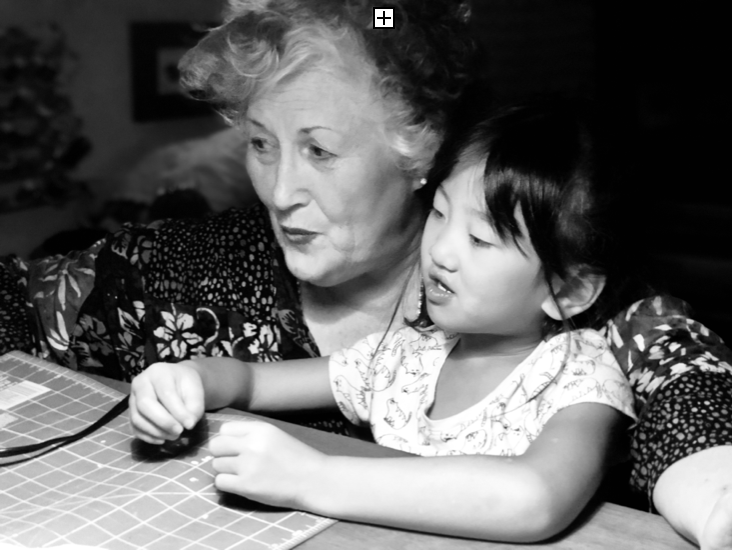Articles
Hanging with the Wrong Kids
Nothing devastates a mother like the influence of the wrong crowd on her child.
She knows her child, she knows him from before he was exposed to those hoodlums! And, Oh! The sway they have over him!!
A child who is easily influenced by others is a child with strong doubts about this own reality.
Few can withstand a society so overwhelming as this one, with its high tech and low ethics.
Of course, if a young man can’t win as himself, he can always become the kids next door, or take on the characteristics of the boys in the neighborhood.
These boys are a liability to society and utterly careless of others, but if he had an overwhelming need to be approved of, he’ll become them.
Now, it you, the parents, fall into the trap of fighting these characteristics in your child, you’ll pay a heavy price – the harmony of your home – and you’ll lose. Force will only further overwhelm him.
What will bail him out is:
* A change of environment
* Helping others
* Learning how to survive in this world
* Good food (organic if you can get it) &
* An education he can be proud of.
With certainty on what he knows and what he can do, no “wrong crowd” can touch him.
Correcting a Teen
Most teens are allergic to correction.
They have been corrected so much, and they feel wrong. They feel that if they get corrected one more time, they’ll die. So, they constantly ward off correction.
Most teens do this with the words “I know”. It doesn’t matter what you say, he’ll cut you off with “I know”.
Some shut you, and your possible corrections, out with noise- cancelling headphones.
Some barricade themselves in their room, and become nocturnal creatures who only venture out when you are asleep.
Some flee life altogether.
Each of these typical teen-behaviors is an effort to ward off correction.
And here you were all worried that your kid didn’t love you! If that were true, he wouldn’t care what you thought of him. No, the trouble is that your approval was all important; he just didn’t get enough of it.
He has this drive to try to be right – it’s inborn; you have this drive to teach him how to survive. Where did it go wrong?
There was a time you could show him how to draw a dinosaur ,or how to bake those cookies. Aaaahh, but those were the days that you admired his art, no matter what it looked like, and you ate those cookies. “Yum, yum” you said, “Thank you” you said, “Yummy!” After that, after you had admired the sweet lumps of undercooked dough, you could teach him all kinds of kitchen magic.
Then he grew up and you expected “better”, you expected “more from a boy his age”, and the Ice Age set in.
And now, with all the admiration long dried up, you are going to revive it. He’ll be a little suspicious at first, but you persist – you admire.
You don’t need to lie and fake admiration for things to which you have been opposed. You just have to admire something about him. If you don’t like the pink and green hair, admire how neatly he did it. “Quite professional”, you say.
Your job is to find things you can admire about your teen.
If this is hard for you, start with just noticing your teen and commenting on him/her. “I see you chose yogurt this morning”. (No right or wrong about it, you are just saying “I know you are there”. It’s an undercut, just seeing each other. You keep this up, 3 X a day, you speak to him without making him wrong. He’ll eventually feel that he can receive your comm and live. After that he’ll notice you too. It’s a start.
How long do you have to keep this up? As long as it takes for him to look forward to your noticing his new band shirt. It’s a form of admiration; noticing.
This is a slow process, there is a lot of upset to bleed off.
Gradually step it up, admire the damn shirt, be curious about the band.
“What kind of music do they make?”
“What’s your favorite song?”
“Can you put that on my phone?” (ask for help)
Any time the above does not fly; back up the gradient.
If you are patient, if you persist, you will again become the go-to person in his life.
In that role you can teach him anything, including judgment.
Love, Joke
Why Do kids Hate Writing Essays?
Essay writing is a subject of much upset and it doesn’t need to be. It is strictly because it has been taught incorrectly.
We have had this incorrect way of teaching for so long, that by now everybody has agreed that essay writing is hell. It is only “hell” because it is taught by the make-wrong method.
If you get a kid to do something he can’t do, and then you take a red pen and make his work a bloodbath , he’ll have a loss and hate it. He won’t learn anything from it, but that he’s “no good”.
This is like putting your kid in the car, turning the key, putting his foot on the gas, and saying, “Go kid!”. And he wraps the car around a tree and his front teeth are gone and there is blood on the windshield and you tell him, “Well, that’s not how you do it.”
He won’t want to drive again! Nobody learns from the make-wrong method.
The components parts of English are so many! (composition, handwriting, spelling, grammar, punctuation, sentence structure etc.) You will have to have mastered all of these before you could write anything.
What we are finding is, that essay writing in taught OUT OF SEQUENCE.
There are two painful aspects to this:
1. The kid is writing before he knows how to write, spell, or make sentences etc., so he has losses there.
2. He is putting forward A VIEWPOINT. This is very brave. He is saying “This is my point of view; I feel strongly about this”. And rather than getting an acknowledgment, he gets correction.
This hurts.
Just imagine, you say “Martha, you and me belong together; will you marry me?” And she says, “You and I, Charley, it’s you and I, okay?” No duplication of the intent. Slap in the face. Very painful.
The only way a student can survive this make-wrong method of teaching is to decide: “The teacher sucks”, and “I must be stupid” followed by “I’m out of here”. And that’s terrible, because once he has decides that – the ship is sunk.
Now the Brits did it right (long ago), they dedicated the first 6 years of school to grammar. They called it a grammar school. You learned how to hold a pen, write beautiful cursive, how to spell, you learned vocabulary, punctuation, how to make compound/complex sentences, public speaking, prose and poetry etc…. You learned all those things in grammar school.
And then you went to High School and to Debate Class. You learned to express yourself , be persuasive and defend an opinion, to use logic and reason, how to deduce, analyze and extrapolate …. This is where you learned to think!
When the student had all that down and he could capitalize and insert commas in the right places, he was asked to write essays.
Then it was a cinch! Frankly, it’s a twenty minute lesson. You sort of explain the structure of it, and you remind him that all the tools he needs for this, he already has. NOW you can say, “Have at it kid!”
In our school we start writing essays about 6 months before finals. None of my students are allergic to writing! When they are ready, they sit down without any trepidations, and they write the most beautiful essays! Then we tweak them a little bit, and a little bit more, lightly, without any make-wrong, and then they sit their SATs and get perfect scores.
It is that simple.
Teaching by make-wrong is a losing proposition. You probably remember it from when you were young, and how you hated it because you couldn’t win. How you were being corrected on something you hadn’t learned yet, how you were asked to do something you couldn’t do.
It’s mean! It kills creative writers.
Please don’t let anyone do that to your kids.
I hope this helps.
Joke
Tired
I used the think of “pain and unconsciousness” as severe pain and complete unconsciousness. I never considered gradients thereof.
Now that I repair students and come across their moments of reduced analytical power, these gradients have become very clear to me. They coincide with illness, injury, drugs and weariness !! (tiredness)
The student at my desk tells me he has a vague recollection of “having done that” (part of math), but he “doesn’t remember”. This leaves him with the idea that he is not too bright. The truth is that he experienced moments of reduced analytical power while being taught. His level of Mind Alert was such that he could not place the data where he could recall it later. (in other words it didn’t get filed in the analytical mind)
There are gradients of weariness, illness, injury and drugs, causing degrees of Mind Alert (see Chart of Human Eval).
What if Johnny is
a little sick (just an ear ache, that’s all)
a little drugged (Zyrtec or Acne pills)
a little tired (wouldn’t go to bed, and I couldn’t drag him out of bed this morning)
often scared of the bullies (you know how kids are)
regularly eats junk food (if I don’t watch him closely)
had growing pains all summer long? (getting tall like his dad!)
Would that be the summer he lost it in math? The time he couldn’t remember what was being taught and he decided to “hate” the subject?
Even if the student in front of me can’t verbalize what happened that summer, he can point at one of the pictures below, which show how ANALYTICALLY THERE he was at the time he was taught. I can then explain to him the gaps in his education. As he was only 20% analytically there, 80% of the data was misfiled under “I don’t know”. He was largely not there to get it. (nothing to do with how smart he is).
Now in Miss Snotgrass’ class he never learned anything (too late in the day; kid too tired)
The boy got an education that beefed up his bank and left him spinning, for every gap in his education makes the next step an out-gradient.
It is my job to find and fill these gaps and get him winning again. This is done by going over every scrap of his education (as he doesn’t know what he doesn’t know) and watching his indicators.
Soon he’ll find the truth: that he is smart and can do anything! What a relief!
Love, Joke
(See:
Educational Dianetics R&D Vol 4, August 1950 – for data on reduced analytical power by reason of weariness.
Chart of Human Eval column AN, Level of Mind Alert)
No Delivery = Betrayal
It is, of course, your job to make sure your kids land of their feet. This means you make sure they are competent in the basics needed to interact with society. These basics haven’t changed in the last few centuries (only the methods): we all know what our kids need to learn as they grow up….. or do we?
Schooling claims at least 12 years of your child’s life, and what does he come away with? Really?
“Modern schools” stress social molding more than academic competence and fail at both. (A child stuck in screens will be hard to teach, and a child who cannot keep up with his class will develop “weird” behaviors).
The idea that education is a matter of “data” made Google a teacher and turned our children into little flash drives (8 for $32 at Office Depot). What happened to independently thinking men and women?
Knowledge is crystallized thought. It’s the result of a process of weighing. It’s a “oooooh” moment that comes with a smile, and total certainty. It makes it possible to act on that new understanding.
You do want your children to eventually act, produce, create and exchange.
Are they actually being prepared for that?
Can your 5-year old read?
Can your 6-year old print correctly?
Can your 12-year old figure a 15% tip in his head? Can he write a
letter? Address an envelope? Can he fill out his application for a
membership at the YMCA, or will he hand it to you, Mom?
Can your 16-year old fill out an application for a summer job? He can
probably compose a symphony on his iPhone, but can he make a
spreadsheet? Does he find reading the classics a struggle or even torture?
If you have been relying on symbols like A, B- and C+, if you have stayed at a safe distance from your child’s education trusting the school to get the job done – reach in now! Check the above points, and at the first “no”; call me.
I have answers, short programs, grammar camps, summer math boosts, quick fixes, one-year programs, college prep tutoring….whatever he needs to restore his confidence and WIN again! (And if I can’t deliver what’s needed, I can refer.)
(760) 954-9197
Call soon and reserve his/her spot.
Love, Joke
Judgment
Judgment is a thought process. It is figuring out how best to survive. It is taking all things in consideration and predicting an outcome. Now if the outcome falls short of your expectations, your judgment was off.
If your teen ends up in the hospital with a fractured skull because he accepted a ride from Joe who came to a sudden stop on a snowplow; his judgment was off. He did not predict that Joe would tackle that snow plow. He could have, he knew Joe to be reckless so and so, but his car was cool and there was a girl watching him. A nice girl who would no doubt remember his sliding into that car. This would make it so much easier to talk to her later about the prom, and possibly kiss her, and maybe score. THAT was his thought process. That was how he figured he would survive – in Lucy’s arms.
So, we do not need to put your boy on a short leash, curtail his social activities, forbid him to see Joe, and give him a stern talking-to; we need to have him look at what he was thinking when he got into that car.
Now, “having a look” only happens when one feels safe, never when one is being challenged.
A workable approach is “tell me how getting into Joe’s car was a good idea. You must have thought that it was a good idea, or you wouldn’t have done it”. He’ll tell you. You may have to word it a few different ways, but eventually he’ll brighten up and tell you about his odds with Lucy.
Lying there in a cast, he is keenly aware that things didn’t work out, and (if you don’t make him wrong) he’ll be open to advice on more effective ways of getting Lucy’s attention.
We are all just trying to survive, and we do it with the data that we have. He didn’t know that women fall in love on the dance floor, now he does. You had a man-to-man with him, and he is learning swing dancing and a box-step or something where you can hold her really close to slow music.
He has a way of being cause, because you taught him.
There are so many situations where a teen flounders for lack of understanding, but will he listen to you? Oh, no!
Read my article “Correcting your Teen” – there is a way to do it.
Teaching IS the route to that judgment we need to instill.
Love, Joke
How effective is my child’s education?
We are long past the time when getting an education meant getting a lot of data. Data, both true and false, is readily available; we have an app for that.
We are also past the time when exclusivity and expense indicated a a good school merely knowing who’ who doesn’t cut it anymore – and there’s an app for that too.
Those who manage data seem to do well these days; this requires evaluation of data. A good evaluator can spot identities, similarities and differences. He can observe what is and project into the future. He can be there. He can think.
There is no app for that.
For a young person to prepare for a successful and productive life, he needs to practice being there, he needs to build certainty on his ability to observe and project into the future.
A surprising number of these successful thinkers prove to be self-taught, homeschooled or the product of a free-thinking uncle with a penchant for blowing things up in his garage.
Somehow these lucky kids escaped the constant pressure to adjust to their environment, and preserved this quaint idea that they should adjust the environment to them.
They could be there, as themselves, form opinions, disagree and grow a healthy disrespect of institutionalism.
They didn’t buckle under the pressure to agree; their education was pleasant, unhurried and casual. This allowed them to engage in the business of learning rather than schooling.
They became brave, independent thinkers – there will never be an app for that.
See Creation of Human Ability R2-55
Christmas Advice
Do you remember what you got for  Christmas when you were 7 or 12 ?
Christmas when you were 7 or 12 ?
I don’t. I am sure there were presents, but I forgot what they were long ago.
I do remember outings, time spent together, concerts (not even the music, but the fact that Dad took me). I remember train rides, fishing trips and most of all, the soccer games.
I shall never forget how he made me feel: special, wanted, loved, safe, accepted.
He didn’t have to take me, there were full-time nannies. He wanted me with him.
We didn’t talk much. He watched the game: I watched him. My Dad, the big man with the rough hands. Mother made him wear gloves, “Doctors shouldn’t have rough hands”. He didn’t care. “It’s what you do with them,” he said. And, he saved lives with his.
 This Christmas you might consider the gift of your time spent with your kids, and they may still tap strength from it fifty years hence.
This Christmas you might consider the gift of your time spent with your kids, and they may still tap strength from it fifty years hence.
Technically you can look at it this way:
Going somewhere acts like a locational. He’s looking around. It’s extroverting. It’s a change of environment. One of the Valid Therapies. It’s a tone raiser.
Going together leads to two-way comm, exchange of ideas, increased reality on each other, formulating thoughts. It raises ARC.
Being invited to come along communicates acceptance. “I want you in my life”.
Don’t make the event the gift; make the togetherness the gift.
A trip to Universal Studios is a gift of flights, meals and money.
Backpacking up a nearby hill together and telling him, by the light of the campfire, the lore of his great-grandpa, Andrew (who was a bit of a rogue) is giving him importance. Bring the pictures of great-grandpa, Andrew, and privately share his unsavory history. Your son is being inducted into the family. This is epic. He’ll never forget it.
It will cost you a bucket of KFC, a day out of your life, and you will be his hero.
Every family has some colorful ancestors; their stories bind us together.
Togetherness is what this season is all about. Kids love to belong.
Make it a tradition to tell family stories over Christmas.
In big family get-togethers of your youth, who still stands out to you? The ones who saw in you the hope for the future and spoke to you like you mattered.
You can be that unforgettable person.
Let me know how it goes, I love to hear wins.
Happy Holidays, Joke
A Truly Ethical Child
An ethical child would be a child who could figure out the best way to get where he wants to go in life. Of course, he figures this out with the data that he has, and he takes the other dynamics into consideration.
That’s a lot of figuring and it takes training. It takes a child above 2:0 (who WANTS to survive). It takes parents who give the kid true data, and parents who invite him to look and consider outcomes.
As a result of this rational process he can then make ethical decisions.
As soon as you enter other motives, incentives or penalties into this equation, you are stepping away from ethics and into discipline, bribery, behavioral training.
If you do not speed in a school zone because you will lose your insurance discount, you may be being frugal. (not ethical)
If you do not flirt with married men for fear that the pastor will hear of it, you may be scared. (not ethical)
If a teen does not touch alcohol so he’ll get dad’s car at 18 (as promised), he’s a good kid, a safe kid, possibly a smart or calculating kid, but not necessarily an ethical one.
If a threat of punishment be needed (“9 hours of kitchen duty if you are late again!”) then the kid is not up to ethics, and the person handing out the penalties knows it.
If you have to tempt your teen with a pizza to get him to finish his school work or clean his room, you are saying that he can’t see the need for the school work or a clean room, but he can see the need for pizza.
Please, you wonderful, dedicated parents, do not fall into the habit of enticing your kids into survival behavior patterns and think you are “making them ethical young people”.
Bypass (where you decide what is survival) has its place, but only with kids who cannot think logically yet, have a lack of data, or are still below 2:0 on the tone scale and so do not WANT to survive.
Nothing, short of teaching your kids how to figure out what the most survival path is, will do.
How do you do that? Two-way comm. Ask questions like ……what could you do about that? How would this help you survive? How would this affect the family? Your group? Your church? Do you know someone who does that? Are they doing well? Whose job is it to handle that? etc…..
You just want your child to look and think.
You may think that these are the questions you ask a 4 year-old, and you are right. And an 8 year-old, and a 12 year-old, a 20 year-old, a 24 year-old…..
Raising your kids means handing over the hats so that they will survive without you. They must learn to do the thinking.
I hope this will help.
Love, Joke
The 2nd Most Common Mistake in Parenting
Surveys are handed out at the beginning of all seminars I do. So I have a good idea what parents have been struggling with for the last 30 years. No matter how they word it, it comes down to three issues: (1) Disrespect for parents, (2) Lack of discipline and (3) Poor choice of friends. Last issue we addressed disrespect. This issue we are addressing discipline.
The Disciplinarian
“It rips me apart!” This is my son we are talking about! I am watching him do these awful things to himself! I just don’t know how to stop it!”
Many parents suffer watching their teens reach for alcohol and sex or concerts where the air is thick with pot, or around the clock video games, or body piercing and pornography.
They, the parents, know these are dead-end roads but they try to explain this to a teen-ager.
Teens want to do their “own thing” and the parents do not want to tread on their kids’ “self determinism” so they back off and keep a wary eye in case it gets out of control.
Then they’ll jump in.
It’s only a matter of time of course… something comes to light that is “too bad” and the family disciplinarian has the stage.
Panic strikes. Tough mandates are handed out. The family in divided into two camps: the jailors and the trapped-at-home teen. He can not go out! He can not see those friends! He can not use the phone… But he can, and does, rattle your cage.
Often one parent must quit a job to be at home and watch the errant child. How long must this go on?
Let’s look at discipline. It means: (1) training that teaches one to obey rules. (2) the result of such training. (3) punishment.
Interesting progression. A disciplinarian, then, is a person who believes in this approach.
The rules laid down at home are already a solution to the problem of no judgment. Now the solution has become the problem: utter rebellion. To persist on the punishment route will not bring about judgment. If it ever appeared to work, it produced only a deep apathy.
The disciplinarian says: there is no ethics, only justice.
Ethics is reason. Ethics is largely hatting. Ethics goes in by definition. Ethics is the contemplation of optimum survival along the dynamics.
If you can honestly say: “I have thoroughly hatted my child. I have thoroughly defined the terms. I have made sure that ethics is understood by my child, … and it still does not go in” guess what? …nobody below 2.0 wants to survive!
Maybe, just maybe, you are working at cross purposes. You cannot force someone to survive. The dynamics are an urge toward survival. People from 2.0 down have an urge to succumb. They are actively working on succumbing.
Nothing, but coming up the tone scale will change that.
The 4 valid therapies which will bring a person uptone are: environment, processing, education, and regulate the amount of MEST which the individual should control.
So, suffer no more. Apply the valid therapies and with that bring him uptone.
Once he has a strong enough urge to survive, he will not reach for the things that bring him down. The family is once again aligned, harmonious and winning.
I wish you harmony,
Joke Reeder
Note: MEST: matter, energy, space and time; the components of the physical universe.
Note: Please read in the book Science of Survival by L.Ron Hubbard, regarding cross purposes and the four valid therapies.
3 Most Common Mistakes in Parenting – First Mistake
Surveys are handed out at the beginning of all seminars I do. So I have a good idea what parents have been struggling with for the last 30 years. No matter how they word it, it comes down to three issues: (1) Disrespect for parents, (2) Lack of discipline and (3) Poor choice of friends. Limited space permits be to address only one of these per issue.
Disrespect for Parents
I recently interviewed a mother who told me about her son’s shocking disrespect for her, his father and all teachers.
The boy, a lanky, sullen thing slouching in the chair next to her, endured being talked about in this manner with a mixture of embarrassment and resentment in his eyes.
I do not know what else the mother told me for I drifted off thinking about what bodily harm I would do the woman were I in his position…
His position. A young man, dependent for all he needs on this woman; obliged to her, legally attached to her, torn between wanting to love her and feeling that he must get away from her, biding his time; enduring.
I rejoined present company as she directed herself to her son with, “Well, SAY something, … have you nothing to say for yourself?” He did not. He did not trust himself to open with mouth.
Oh! Where did we get this idea that we can treat our children like dirt and from that they learn to treat us golden?
How would you like to be given a string of orders day in and day out” “Get in the car and put your seat belt on. Keep it down back there. No, we don’t stop here for fries. As long as I pay for your food you will eat what I get you and get your fingers out of your mouth, filthy habit that… You do that one more time and I will take your Play Station away for a week.”
About six generations ago we fought a bloody war to outlaw slavery. Some of us thought it was not right to order other people around, treat them like dirt. A slave owns nothing that you cannot take away from him. A slave gets no respect, is totally dependent for all her needs on the master, is legally attached to him and must not fight back. But he can resent and he can feel embarrassed for her master. He can endure.
You can never turn your back on a slave or a child whom you have treated this way. His survival lies in fighting back, covertly at first and openly as he grows taller and stronger and the time nears when he can legally leave the plantation/family.
Hard words. We mean well. We work hard to provide the latest electronics and the expensive sneakers for our kids and we want some respect! And you will have it, IF you take some time off to spend with your child and treat him as you would your dearest friend. Think of someone you admire above all others and start treating your child exactly as you would that person. You will be amazed how forgiving children are, how quickly they respond, how much they have wanted to love you and how they will treat you golden.
All that you saw in them in the beginning that was good and beautiful and true is still there. Enjoy your kids!
Love, Joke
Math – The problem isn’t the student
MATH – THE PROBLEM ISN’T THE STUDENT
The year – 1952, the place – Chicago (not really, but it sounds good).
At this point math was reason, and it was taught in a sequence which allowed one to follow the trail of cause and effect. Folks could think with math, use math, solve problems with math and tackle complex issues in business with math. A good grasp of math got you into college, through college, into business and through life. With math you could whip the problems of many facetted situations into submission, you could get exterior to it, spot cause and effect and zero in on the solution.
Enter: the Progressive Education Association, with members such as John Dewey, Edward Thorndike (who conducted early behavior experiments on chickens), and Dr. Zeigler, chairman of the Educational Committee of the Council of Foreign Relations.
The stage is set. The sole work of the group: “to destroy our schools”. Charlotte Thomson Iserbyt – The Deliberate Dumbing Down of America
Dr Zeigler, (quote): “That is what we want… a math the pupils cannot apply to life situations when they get out of school!” (end quote)
To do so, they threw all reason out and replaced it with memorization. Further: definitions were removed, sequences were reversed, and formulae were distilled to the point where the mass they were based on could no longer be discerned.
They recognized how vital math was to survival – and it had to go!
LRH says: “Mathematics, for instance, is a whole body of formalized knowledge, most of it abstract, and every single scrap of it has to do with survival.” – L. Ron Hubbard, Education & Dianetics
And he was right, for it had everything to do with reason! The study of it made men and women into rational thinkers. (Look at the very meaning of ‘rational’ = it can be expressed as a fraction; it is the relationships of numbers.)
The discipline of math is a training ground for the mind. The mind learns to think along rational paths, which are codified in laws.
All math = the logic of problem solving, written in a shorthand notation.
YOU LOSE THAT, AND YOU HAVE LOST THE WHOLE POINT OF THE SUBJECT! The way math is taught now, you might as well memorize train schedules for all the good it will do you in life!
And you wonder why Johnny isn’t interested? He’d be nuts if he were!
In 1952 the “New Math” was introduced. And since then the subject has been butchered a little more each year. So don’t wonder why Grandpa has an easier time helping Johnny with his homework than you do! He was taught – you were robbed!
Look what problems this has created! Far too many people shy away from: making change, figuring a tip for a waitress, doing their own taxes, making investments, they are the effect of credit cards and finance agreements, they don’t understand and so fall victim to bad deals, they avoid jobs which might “give them away” as the dummies they think themselves to be. It is horrible and painful to see how a whole life can be contorted to avoid the admission that one never understood the subject of math.
Now cut to the year 2010, and Johnny is a good boy. He works hard, he clears his words and makes his demos, he tries so hard, but somehow he still can’t picture it. He resorts to memorizing. His best friend gets wonderful grades; how he wishes he could remember all the rules like Billy does. But halt! It gets worse, his supervisor tries to help him, and he refers the student to the material so carefully crafted to be of no use to him (even the chicken found it so) Maybe the student has misunderstood words, or maybe it is a skipped gradient… damn straight it is! It was skipped 50 years ago!
Of course, the sup, himself, is a victim of New Math, and he can’t help him find something he doesn’t even know is missing! Sound familiar? … material out of order?… chapters missing?
How much sense does it make to learn multiplication and division of fractions before addition and subtraction? Yet, every math text since 1952 has it that way. Maybe Mr. Hubbard’s transcriptionist had a cousin?
You have to read a lot of pre 1950’s math texts to find what is missing.
Trust that we know this, we’ve done it.
Call us about our “Good Old-Fashioned, No-Nonsense, Get-You-Into-College Math Program”. (You know, the one your Grandpa would recognize)
The problem isn’t the student.
Joke Reeder and Sarah Brauninger











